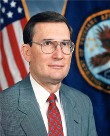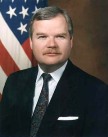National Cemetery Administration
Directors & Undersecretaries for Memorial Affairs, 1973 to Present (3 of 5)

Allen B. Clark, Jr.
Director
National Cemetery System
Department of Veterans Affairs
(1991–1993)
Allen B. Clark, Jr. served as Director of the National Cemetery System from November 22, 1991, to January 19, 1993, as an appointee of President George H.W. Bush. Clark's term was marked by innovations in quality management and record keeping. He introduced quality-improvement principles to cemetery operations, and implemented the groundbreaking Burial Operations Support System (BOSS), which allowed for all-electronic record keeping of burials and headstone-order activities. During his tenure, San Joaquin Valley National Cemetery also opened in California, and two new state veteran cemeteries were established in Tennessee.
Before joining NCS, Clark was Assistant Secretary for Veterans Liaison and Program Coordination, Department of Veterans Affairs (VA). Prior to government service, he was a community and business leader in his native Texas. Clark held leadership positions with the Republic National Bank of Dallas; Young Executives Group, Dallas Council on World Affairs; Special Gifts Division, Dallas American Heart Association; Leadership Dallas Alumni Group; and the Vietnam Veterans Leadership Program in Austin. He was president of Pressure-Coring Inc. and a real estate investment company, Clark-Preston, Inc., which he co-founded in 1983. Clark served as Special Assistant for Administration to Texas Governor William P. Clements, Jr., 1979 to 1981. Clark graduated from the U.S. Military Academy at West Point in 1963 and earned a master's in business administration in 1970 from Southern Methodist University in his home state of Texas.
In Vietnam, Clark was assigned to Army Special Forces. He was severely wounded in 1967 at Dak To Special Forces Camp in the Central Highlands, resulting in the amputation of both legs. He retired with the rank of captain. Among his decorations are the Silver Star, Purple Heart and Combat Infantryman's Badge.

Jerry Wayne Bowen
Director
National Cemetery System
Department of Veterans Affairs
(1993–1998)
Jerry W. Bowen was the Director of the National Cemetery System (NCS) from May 20, 1993, to April 3, 1998. Under his management, Tahoma National Cemetery opened in Washington State and public information kiosks were introduced at cemeteries. However, Bowen felt his greatest accomplishment was in securing funding for the construction of five new cemeteries to support veterans in the coming century. These sites included the national cemeteries at Ohio Western Reserve, Dallas-Ft. Worth, and Gerald B.H. Solomon-Saratoga in New York. During the same period, nine new state veteran cemeteries were established in: Hawaii, Minnesota, New Hampshire, Vermont, Virginia, Wisconsin, and three in North Carolina.
Before joining NCS, Bowen was a community and business leader in his home state of Arkansas. There he founded and headed JESTCO Fitness Inc. in 1991, and he owned a 400-acre rice and soybean farm. Bowen graduated from Arkansas State University with a B.A. in agriculture education and an M.A. in business administration; he also graduated from the U.S. Army War College, and Army Command and General Staff College. Bowen was an Army ROTC Distinguished Military Graduate and was selected as one of the "Outstanding Young Men of America" in 1974.
Bowen's 26-year career as an Army infantry officer included duty in the Dominican Republic, Vietnam, and Germany. His postings at the Pentagon included Chief, Department of Army Protocol; Chief of Staff, Army National Guard Directorate; and Deputy Operations Officer, Military District of Washington. He retired with the rank of colonel in 1989. Military decorations included the Legion of Merit, Bronze Star, Meritorious Service Medal, Joint Service Commendation Medal, Armed Forces Expeditionary Medal, Combat Infantryman's Badge, Ranger Tab, Senior Parachutist Badge, and Pathfinder Badge.

Robert "Mike" Walker
Under Secretary for Memorial Affairs
National Cemetery Administration1
Department of Veterans Affairs
(2000–2001)
Robert "Mike" Walker was confirmed by Congress as Under Secretary for Memorial Affairs, National Cemetery Administration (NCA) on September 8, 2000. He had filled this position for several months previously, starting when President William J. Clinton named him as Acting Under Secretary as of December, 22, 1999. Walker left NCA in January 2001.
Perhaps the largest change Walker oversaw was the reorganization of NCA's field structure to accommodate the growing number of cemeteries under development and construction—by late 2000, the National Cemetery System had grown to 119 national cemeteries containing 2.3 million graves. Two new Memorial Service Network (MSN) offices were created in Oakland, CA, and Indianapolis, IN, to complement the three existing MSNs in Philadelphia, Atlanta, and Denver. Two new cemeteries opened: Dallas-Fort Worth National Cemetery in Texas and Ohio Western Reserve National Cemetery in Rittman, OH. One new state veteran cemetery was established in Wisconsin.
Walker was named Deputy Director of the Federal Emergency Management Agency in September 1998. In 1994 he served as Assistant Secretary of the Army, followed by the Army Acquisition Executive, and Under Secretary of the Army; he was also Acting Secretary of the Army for several months in 1998. Walker worked in various staff positions on Capitol Hill for twenty-five years. He was the staff director of the U.S. Senate Subcommittee on Military Construction of the Senate Appropriations Committee; his earliest public service was as a page in the U.S. House of Representatives during the mid-1960s.
Walker was an enlisted soldier in the Army National Guard of Tennessee and the District of Columbia, and he attended the University of Tennessee in 1966–1968.
1 From early April 1998 through early September 2000, a series of acting directors or under secretaries—including Walker—headed the organization. During this period, per Public Law 105-368 of November 11, 1998, the organization evolved from an agency to an administration: The name changed from the National Cemetery System, which was headed by a Director, to the National Cemetery Administration, which is headed by the position of Under Secretary of Memorial Affairs.

















